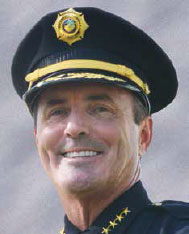 We find ourselves leading our profession and our agencies in a time of accelerating change and increasing disruption. Law enforcement isn’t the only field facing this challenge—in his latest book, Thank You for Being Late, Thomas Friedman, an internationally renowned author, reporter, and columnist, points out that the increasing forces of accelerating change are outpacing the human and organizational capacity to adapt.
We find ourselves leading our profession and our agencies in a time of accelerating change and increasing disruption. Law enforcement isn’t the only field facing this challenge—in his latest book, Thank You for Being Late, Thomas Friedman, an internationally renowned author, reporter, and columnist, points out that the increasing forces of accelerating change are outpacing the human and organizational capacity to adapt.
Our police leaders, officers, and agencies are working to provide the best path forward while collaborating with internal and external forces that are constantly evolving. Body-worn cameras, calls for police reform, protests in our communities, de-escalation, procedural justice, and expanded calls for service beyond law enforcement’s traditional duties are all forces that require our attention and disrupt our daily organizational functions. Leadership has never been easy, but leading today, in this time of constant evolution, pressure, and disruption, involves multiple complexities that the profession and our leaders are trying to navigate.
So how do we pilot our agencies through these complexities at the most critical of crossroads for our profession and the communities we serve? During the 2016 IACP Annual Conference and Exposition, Simon Sinek spoke eloquently to the primal responsibility leaders have to “make their people safe” and to create a “circle of safety” allowing their people to go about their work and life with confidence. He also spoke to some of the key qualities of leadership, stating, “Leadership is not about being in charge—it is about caring for those in your charge,” and “leadership is doing lots of little things that in culmination make a great culture.”
If you didn’t get the chance to attend IACP 2016 and hear Simon Sinek speak, I highly encourage you to listen to his insights into leadership and law enforcement. The video of his IACP 2016 address can be viewed on the IACP YouTube Channel (www.youtube.com/TheIACP). No matter your rank or organization, by the nature of our profession, we are all leaders. We lead in our communities on a daily basis by providing support for our citizens, including those who need our assistance the most.
Being a leader is an incredibly important role. As leaders, we influence our professional and organizational culture, and that carries over into our officers’ belief systems and behaviors. As we strive to be strong leaders within our organizations, we must ensure that our officers believe and trust that we care deeply about them and their well-being—we must serve and protect them with the same vigor with which we serve and protect our communities. We must learn to listen with empathy and compassion, so that our officers and our communities feel that, even if we cannot solve a problem immediately, we do understand and empathize. “If it matters to you, it matters to me!”
We, as leaders, must be open to what we do not know or perhaps understand—learning must be a priority for us, and we must not be afraid to admit what we don’t know. Instead, we should use the opportunity to learn: “I don’t know, so what must I learn and become aware of?”
As part of that quest and drive for our own continued education, we must also elevate the education of the people under our leadership and within our agencies. Law enforcement requires more than just techniques and tactics. It requires judgment, discernment, understanding, and a level of reflection that comes only from continuous and intentional learning. If we expect the individuals within our agencies to think, act, and produce the results that leaders do, then we must start their leadership development on day one and continue that development throughout their career.
Simply put, these times require a high level of enlightened and compassionate leadership—a level of leadership that I know is within all of us. It is the reason we chose this profession—to lead our communities into a safer, more cohesive, and better place. What drew us to this profession, to public service, and to a commitment to good, is what we need to exude every day, both inside and outside of our agencies.
What an exciting time not only to be in the policing profession, but also to lead the profession! With all eyes on us, we are called to be at our best and to elevate our agencies and our profession. We must be bold and courageous as we lead, and, in an age of disruption, we must be the disrupters of mediocrity and the status quo. The moment we find ourselves in is big, challenging, and complex—but it is not bigger than the collective global leadership in policing. As your IACP president, I am eager to serve you as together we serve the noblest of callings. v


